What I beheld since my last weeknotes
An intentionally browseable set of weeknotes for my previous “week”1.
I beheld
I’ve decided that “beheld” is the best word for “things I read such as a book, or watched such as a movie, but didn’t play like a game, or didn’t engage with for work”. Suggestions for better terms are expected, but I’ll probably ignore them, “beheld” feels worth writing about.
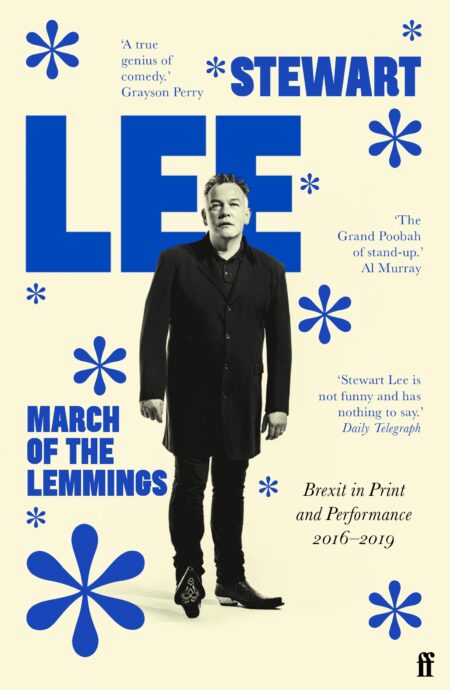
Stewart Lee.
I read March of the Lemmings by Stewart Lee ages ago, but only found my notes on it recently. This is definitely for you if you like Lee’s relentless demeanor, political stance, and whipsmart phrasing. I’m reminded of TV series such as Community, or Ted Lasso, when sometimes you have to hit Pause and let a phrase sink in. It could be a bit much all in one go, so a good bedtime read when you just want a fun chapter or two to put the day behind you.
My notes on Matthew Syed’s Rebel Ideas were in the same pile, although I think I read that at the start of the year, so I’m covering this here too. It covers a subject close to my heart - the power of diverse thinking, and how intentionally seeking out and blending different points of view leads to better ideas. To me this is self-evident, but to actually support that point of view this book provides well executed research and well constructed arguments, and it’s well referenced too. When I read this some time ago, it had much the same effect on me as Range, in that I agreed with a great deal of it, made a note of many of the quotes and references, was impressed by how well it was put together, but inevitably disappointed in how rarely these opinions are seized on to actually make a difference.
But, as per Angela Duckworth’s Grit - I feel the key points could have been a pamphlet. I.E. “homophily creates happy but useless groups” is a simple point and relatively self-evident - to me2 - so the extensive proof and commentary on that point could have been an appendix… with more and more convincing points made until the reader agrees and can move on.
But maybe my desire for a pamphlet is because whenever I’m reading I mistakenly have one eye on my “to be read” pile, so I wish points were made quickly, and in a way I could flick through. Whereas part of the reason this book is so engaging is because the prose style is a very easy read, and overall the arguments and the threads are well constructed. I felt like I was being spoken with, not spoken at. And there are such great quotes within it too, maybe they need spacing out just to let them sink in?

The power of thinking differently.
As an example:
“The more challenging the domain, the less that any single person – or perspective – can hope to grasp. With prediction teams, homogeneous minds make the same errors. With problem-solving teams, they get stuck in the same place. With strategy teams, they miss the same opportunities.”
There should be a blog post on the most useful ideas from the book at some point, I’ll update this blog with a link when I write that up.
The Sea Beast is a great film, an animation out recently3 on Netflix. A kind of fantasy pirate adventure, best watched without looking up too much about it online, or watching the trailer too closely. Definitely suitable for adults and anyone but the smallest of children, as there’s a significant amount of peril. I especially liked the character development, and the “adult themes” dealt with - such as the acquisition and retention of power - and just enough world building to make everything work… and a great set of performances by the cast.
And fantastic animation, especially the water effects:

Peril.
Benjamin Taylor made some interesting points in his “The future of work is: no jobs” presentation, especially around the way we work and the unspoken concepts that support that. Many good points throughout, but striking for me was a nice explanation of Venkatesh Rao’s definition of being “above the API” or “below the API”, depending on whether you’re distributing work using algorithms and services, or you’re the one having work distributed to you. I liked how aspirational it was, on what might be possible.
Additionally a highlight was the thinking that came from Taylor’s three tribes that workers divide into: blue: a permanent employee who gains their identity from their employer; green: people focused on their cause, say NGO members; and orange: nomadic and independent workers. I’m very strongly orange but in watching this I really liked that Taylor reached the conclusion of different people being in different tribes - whereas analysts/futurists tend to advocate for a completely orange future of empowered gig workers.
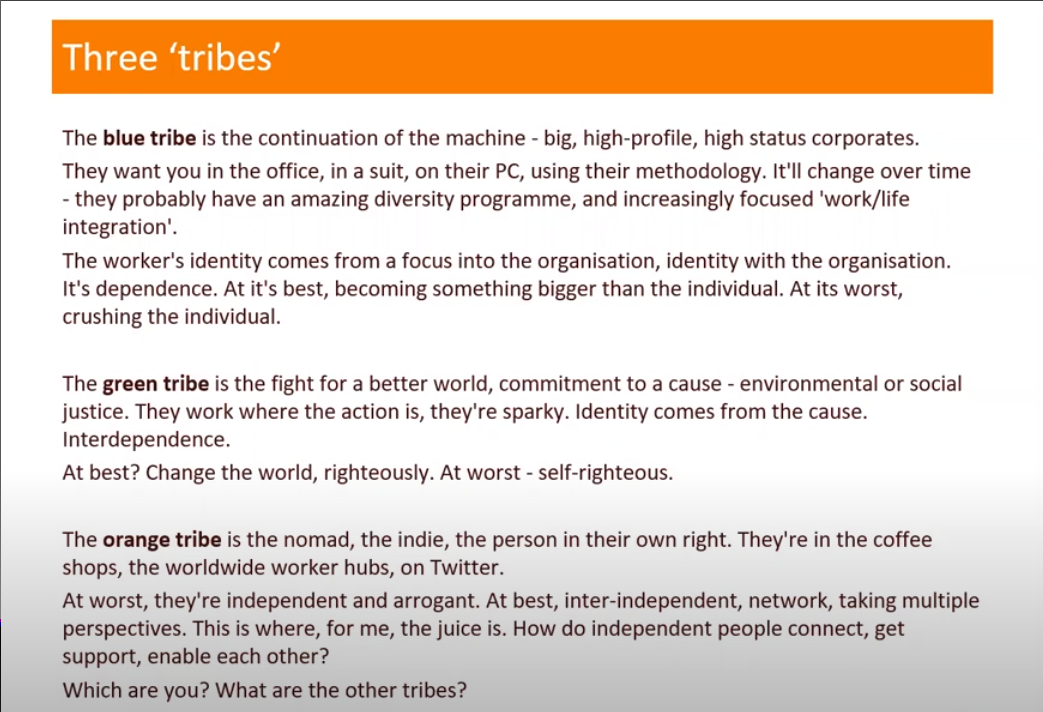
Taylor's three tribes.
And, as always, any kind of sports analogy intrigues me, and Taylor linked his ideas to the Dutch idea of “Total Football”, which I hope to learn more about at some point. If you’re interested do watch the video - the audio problems are worth persevering through - and I expect commentary is still possible on LinkedIn if the algorithm permits.
I watched this presentation on Leadersmithing by Eve Poole. Having watched it a couple of times I either think it skirts too close to being a “typical” TED talk… or it’s a really engaging presentation. Which attitude I have seems to depend on what mood I’m in, so YMMV. Poole raises thought provoking points, especially on self-programming through emotional impact. For me, by extension, that leads to using games to improve your personal “templates”, because of the artificial emotional intensity that games can generate. This is worth twenty minutes of your time during a long coffee break.
A friend pointed me at “The Gambler Who Cracked the Horse-Racing Code” on, well, exactly what the title suggests: a gambler able to win consistently at horse-racing. It’s always interesting to see how someone thinking differently, either by being particularly innovative, or just working on something relentlessly, can outsmart a system or a design. One thing that stuck out for me was the use of video analysis to inform statistical analysis - when my shallow experience is that analysts tend to fall on one side or the other. In this case, one of the team involved, Bob Moore, would “watch footage of past races to identify horses that should have won but were bumped or blocked and prevented from doing so. It worked as a kind of bad-luck adjuster and made the algorithms more effective.” That’s particularly smart, and rare.
I watched the film Greener Grass, or visited Greener Grass, or something. If you like unusual films, and want to visit somewhere recognisable but different, just watch the film. The trailer4 tells you far too much, don’t watch that. If it reminds me of anything the film reminds me of Dave Made A Maze, which both is and isn’t in this world - if you get into it you’ll think slightly differently for an hour or two.

Greener Grass is an experience.
Ron Goes Wrong was a fun animated film, about a “must have” kids robot that, well, goes wrong. To damn it with faint praise, it was pleasant to watch, and might be a good way to start conversations with your children on why technology pretends to be your friend. But as a film I found it very firmly “alright”, a lesser version of something like Big Hero Six or The Mitchells vs. the Machines or Turning Red.
The series Wedding Season was great, a lovely contemporary romcom/thriller. Tonally there were quite drastic and dramatic changes, but I found this enjoyable and exciting. Sometimes in other works exhibiting the same I’ve not been sure if I’m watching something that’s simply all over the place by design, or inconsistently written. Anyway - on reflection it had all the things you only notice if they’re not there, snappy dialogue, a consistently good ensemble cast, and in-particular genuine chemistry between characters. My only disappointment was the ending, which I think should have been saved for a season 2 trailer or opening. Definitely worth your time, you’ll know if it’s for you by the end of the first episode.
Gallants is a film that would have meant more to me if I knew kung-fu movies better, but I appreciated the story and the tropes all the same. It’s especially recommended if you’re a kung-fu fan, and after you’ve seen it watch this from Youtuber Accented Cinema.
Buzz Lightyear is a spun-off idea from the Toy Story films. It does contain significant peril for a kids’ film, and deals with adult issues so you parents might get into conversations you’re unprepared for. As an adult it’s a fun watch, well put together, and has surprisingly good voice acting from actors without a background in voice acting.
Amelie was delightful and enchanting, but with a surprisingly dark edge. Not being sure how to describe it, I’ve stolen this description from the Internet: “A fanciful comedy about a young woman who discretely orchestrates the lives of the people around her, creating a world exclusively of her own making.” Just in case you haven’t seen this already - it’s best to trust me and just jump in rather than hunting down trailers or reviews, the more that’s revealed to you during the film, the better.
If you’re familiar with the Moomins then you’ll know what to expect from the Moomins on the Riviera. It’s a very gentle film, but with surprising amounts of peril. Having left this post for so long I see that most of what I’ve watched is a kind of magical realism5, where we’re clearly not in this “consensus reality”, but the majority of aspects are taken from it. If you’re not familiar with the Moomins… you should be, and this is a good introduction.

Moomin magnificence.
Madame is yet another film to not read about or watch the trailer for, watch it if you like thoughtful intelligent films. Impeccable performances, well formed - whatever that means - I loved the story and the characters but also hated the characters… you’ll see.
The Good Liar was an intense watch, about a con artist deceiving a well-to-do widow. And I’m beginning to think I should just say at the top of this entire section that you shouldn’t watch the trailers for the kind of films I endorse… but this trailer isn’t too revealing. I figure I’m more plot-driven than most in how I enjoy movies… wondering both what I would do in the position that the characters are in, and wondering how the script-writers will resolve the narrative to a satisfactory conclusion, and how they’re trying to guide or mis-lead us along the way. Unlike some of the joyful animation above, The Good Liar definitely has adult themes, and some violence. The plot is maybe its weakest point… maybe… try it out.
( and if you’re reading this soon after it’s “published” in December 2022, and are in the UK, this is on the BBC iPlayer until the middle of January 2023 )
Moonfall was a really intriguing film. As it covers “the hidden history of the Moon” I suppose it’s to be expected that it was all over the place in tone and theme, and is kind of awful. Most of the actors involved elevate the average material, and one of its core ideas… the moon falling to earth… is really interesting on what it might lead to. But instead there’s simply too much suspension of disbelief required - even from me - on what technology is or isn’t capable of, how gravity works, and so on. Not a “so bad it’s good” film, but close.
Hilda and The Mountain King makes the most of the emotional weight of two series6 before it. Ostensibly for children, it does contain bucketloads of peril, and deals with adult themes. I really enjoyed it, but I think I find it far easier than most to get into something like this; if you’re dry adult response is “but it’s a cartoon!” then this is not for you. From a creative perspective, the world building is particularly good - what appeals to me is how a magical environment has been imagined and then logically extrapolated… it feels well made and thought through, rather than the characters and their decisions being protected by “plot armour”.
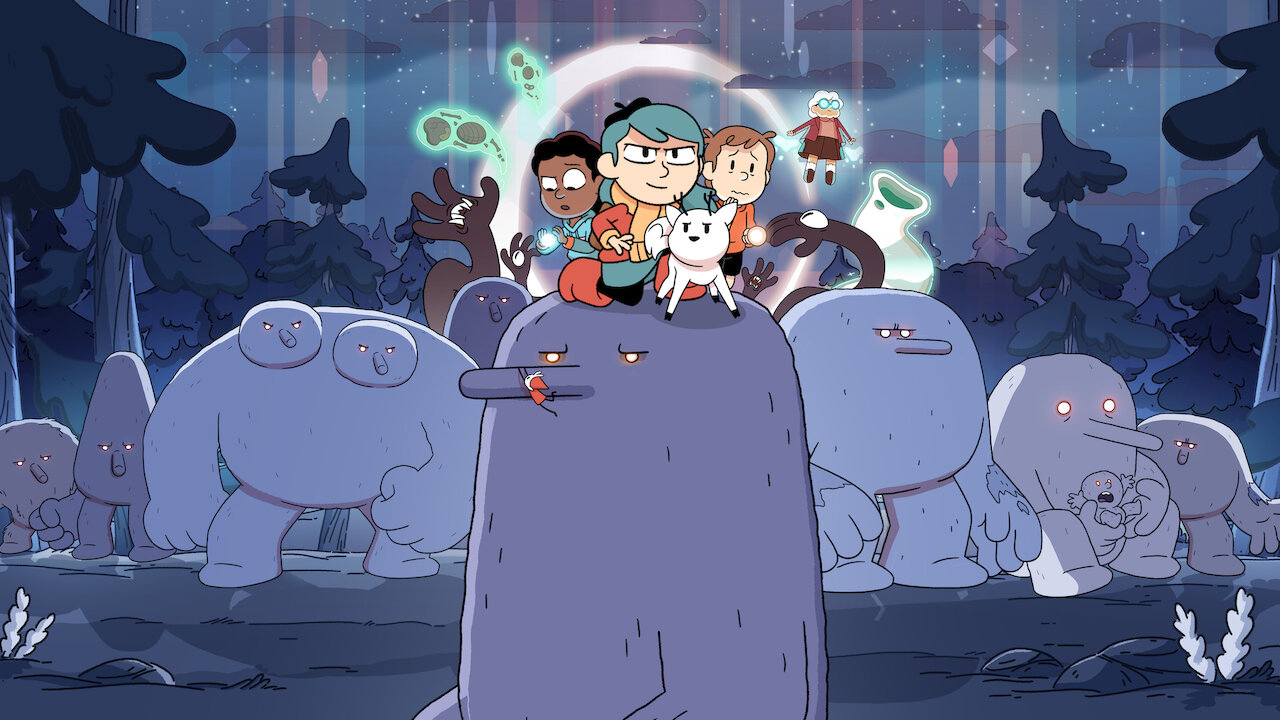
Hilda and friends.
I started watching a couple of documentary series on Netflix. For both of them, I really like the emphasis on the subject - whereas a lot of contemporary documentaries are much more about the documentarian than the subject ( Adam Curtis, Louis Theroux, Jon Ronson… Jeff Goldblum even ).
Firstly - The Playbook. I’ve a soft spot for the wisdom of sports coaches, I think they exemplify useful lessons in leadership, handling pressure, developing strategy and more, all in such a concentrated and analysed environment. I’m a little way into the series, the episodes I’ve watched so far were good. The first was on basketball coach Doc Rivers, which made it clear why I’ve heard the name so often even though I pay so little attention to basketball. But similarly I don’t follow women’s soccer, so I hadn’t heard of the second subject Jill Ellis, head coach of the American national team. This episode was particularly interesting, as Ellis required the mindset to take a successful team and maintain that level of play, rather than having to improve the team. She achieved this by emphasising how that makes you kind of an underdog… you’re the best team, but you’re the target of everyone else. Similarly it was eye-opening on how recently anyone atypical, such as a lesbian, had to hide themselves to succeed. The third episode covered football manager Jose Moirihno, I loved his confidence, and his realism about the level of players he was dealing with… it wasn’t about coaching them, it was about coaching them to work together: “I don’t coach football players, I coach football teams”.
Secondly - Losers, on how athletes have used and built anew from defeat. I was really struck by both episodes I’ve made time for so far. The first “The Miscast Champion” is well told, and great to see boxer Michael Bentt’s journey, his fortitude, and his talent in the arts emerge. The second episode covers Torquay United… and is an incredible story. If you’re an anglophile or just interested in sports narratives, this is one to watch.

This is also a sport, welcome to "mob football".
The documentary that started me looking at Netflix for these was The Rules of the Game is available on YouTube or Netflix. Great coverage of a very English sport of mob football. I’ve never seen a version of this played live, but I just love the idea: a sport with a 900 year history, each game lasts two days, each of the two teams has a “core” of 600 or so players, but each with at least that many again each year when the game is played. As I sit here typing this part up, with World Cup penalties on one screen, the NFL Network about to start their coverage of NFL week 15 on the other… I’d love to see this game covered like a more professional sport. Something like drones watching from above, statistics on where the ball has been and how it got there, commentators with telestrators, and so on.
But in the meantime… I enjoyed the fifty minutes of The Rules of the Game. If you’re intrigued but not “fifty minutes” intrigued, try this article or this short dissertation video for a quick summary. If you want to focus on just how much this game means to the players, do watch Shrovetide - The Birth of Medieval Football - that last one is another well constructed documentary, and has some legendary sports stories ( and I don’t say that lightly, as in the last week I’ve watched a World Cup decided by penalties, and the greatest comeback in NFL history, play out).
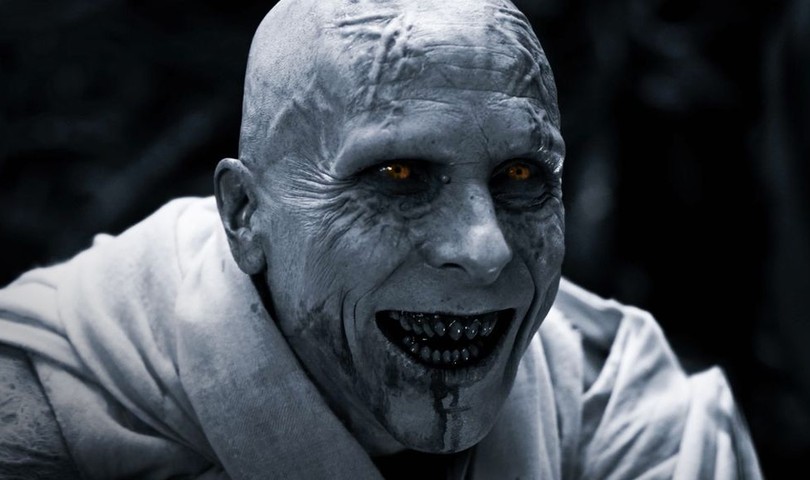
Surprisingly, I would have liked to see more of this in Thor: Love and Thunder.
Back to the movies, and Thor Love and Thunder was, was a thing that happened. I really liked some of the ideas… the relationship of worshippers to corporeal gods, and in such a universe the possible relationships those gods could have with each other. Maybe examining how the gods could or would act when they are so powerful but still face universal issues like love and disease? There were so many crunchy subjects that could have been examined and played with. But this opportunity was wasted. I mean the film had some great moments, but I found it mostly perplexing.
Having spent so much time in it, I have a lot of patience for the MCU7, I would have loved to have seen long arcs exploring these issues, say the god butchering ( Gorr the God Butcher is pictured above ) as a mystery that takes Thor away from the Guardians of the Galaxy, and then once revealed we see the background of Gorr in flashback, putting the audience in a quandary as they compare his violence to his origin? Furthermore, by spreading the narrative over several films, the set pieces would have been more impactful than this, where it felt they were all squeezed in to the available runtime.
The film feels rushed, and feels like it was more fun to create than to watch - in general there’s a “we’ll fix it in post” attitude, which is specifically apparent with some of the CGI, where New Asgard villagers flail wildly at enemies that no-one had time to insert. Combined with a lack of understanding of the gravity that Marvel storylines can have… the children of multiple massacres ( Hela on Asgard, Thanos on the Statesman spaceship ) are kidnaped by what is, effectively, an ethnic cleanser… but LOL, Thor’s an idiot, his axe is jealous, japes are afoot.
Overall it feels like four good films smushed together into one poor film, much less than the sum of its parts, but all squeezed in to ensure it included all the bits the director liked. To my inexperienced eyes like a first draft script and first pass CGI - and this is from watching it on Disney+, which was essentially the second version of the film. It feels like a “too big to fail” franchise combined with staff too big to say no to.
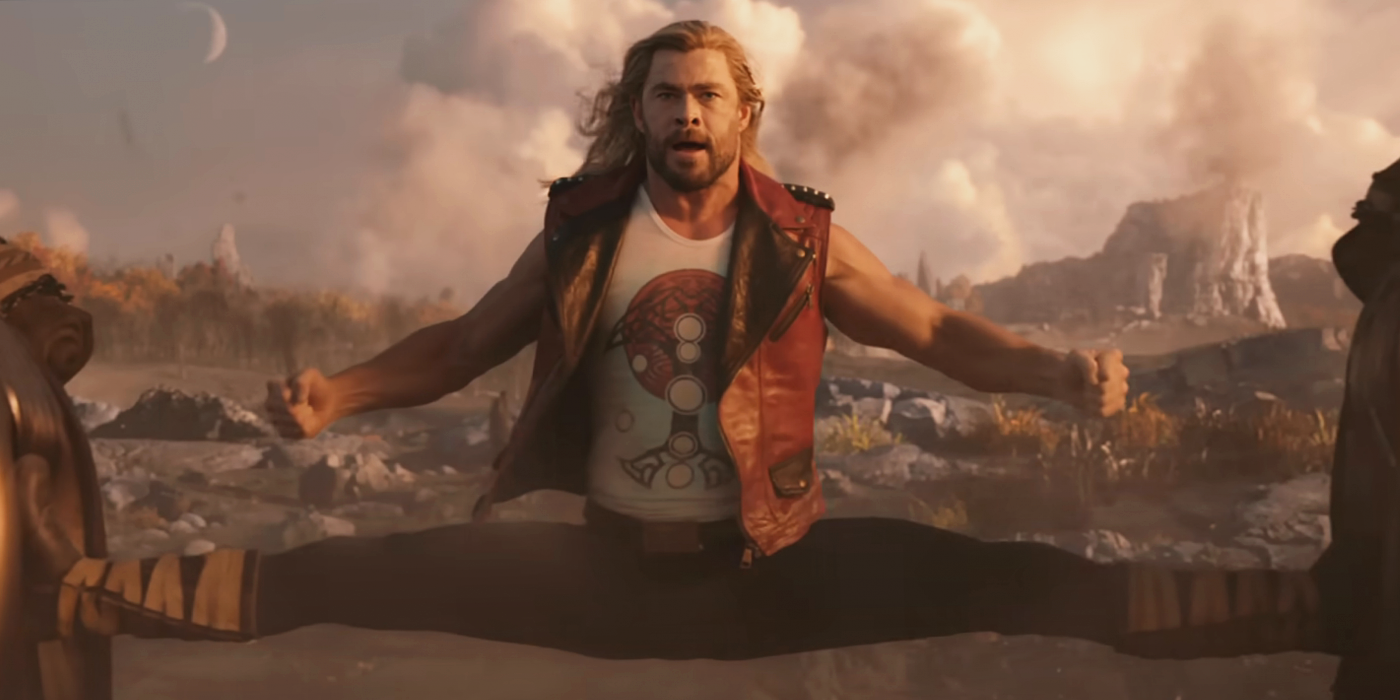
No.
As a counter, the Guardians of the Galaxy Christmas Special felt like a well executed combination of whimsy and emotion that worked; but I suspect whether you watch that or not is completely dependent on whether you’re immersed in the Marvel Cinematic Universe or not.
Dhoom:2 is a weirdly paced film, for me who rarely watches Bollywood films. Some special effects are much better than others, and I don’t know how else to put this, sometimes the use of locations is perplexing. But a lot of what felt weird is cultural references I think, including the narratively inexplicable dance scenes. It’s quite long, but moves along swiftly, and if your usual fare tends to be like mine then it’ll be good to watch, as long as you’re OK alternating between being enthralled, amused, or perplexed.
I gave the new Halo series a try. At the start I liked that they appear to have thrown out a lot of the plot of the game. As far as I remember anyway, from the video game there are nuances there I don’t remember that well, the majority of the actual game is “walk down a long corridor killing everything on the way, do the thing, walk all the way back killing all the new things”. As happens often with this kind of material, or maybe just the things we make a point of watching or that my partner finds, the actors are elevating the material. Which I think is the nature of the medium, some of this is good, some of this feels cut-scene level, but it’s the actors who can make you believe it. Particular note to “Shabana Azmi” as “Admiral Margaret Parangosky” - it might just be I’m too used to seeing sci-fi leadership/hierarchy as thinly veiled US military simulacrums, but from the episodes seen so far, she’s particularly good. But as a final note - after that enthusiastic review written a couple of months ago, I haven’t watched an episode since.
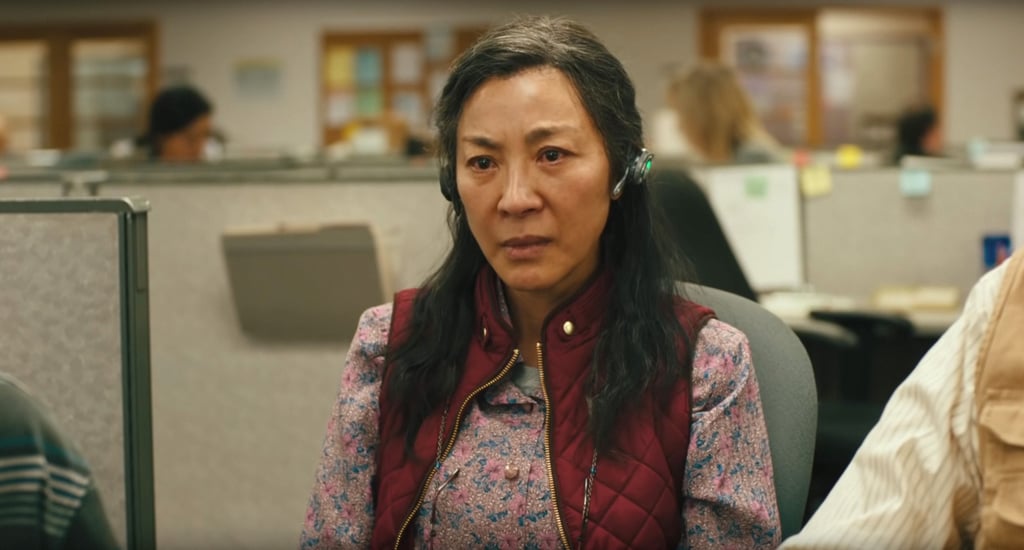
Taxes.
Everything Everywhere All At Once has probably finally dispelled my “I dislike Magical Realism” belief once and for all. This was an amazing film, about a woman trying to complete her taxes. When I’m sometimes disappointed in how unambitious filmmakers are with the medium of film8 this is the kind of ideal film I have in mind, rather than relatively dry and linear narratives we’re used to. Many years ago I read “Love in the Time of Cholera”, which put me off magical realism as a concept, but thankfully I’ve been eased away from that attitude by films like this. I mean I think it’s “magical realism”, but it is a film that defies categorisation I think. I haven’t looked up online reviews, so it defies my categorisation at least. It’s worth watching if you enjoyed something like Baz Luhrmann’s ‘Romeo + Juliet’, that is some 26 years old now.
I’m usually just unstimulated by musicals, I don’t hate them… but I don’t not hate them. Come From Away was an exception, it made the absolute most of the form, I can see why it is so well regarded. Well put together on such a difficult subject, entertaining and heart warming and heart wrenching. Oh, the subject… it’s a musical, so it’s about “the events in the Newfoundland town of Gander during the week following the September 11 attacks, when 38 planes, carrying approximately 7,000 passengers, were ordered to land unexpectedly at Gander International Airport” in Canada. If you’re like me, and like not knowing where a narrative is going to go, and have an over-developed sense of empathy, this is for you.
( I think I like any thing if it’s a really good example of that thing - for example most paintings don’t do a lot for me if I wander around a museum seeing so many, but two or three will really move me. I still recall how I felt seeing Delvaux's Crucifixtion a couple of decades ago. )

Delvaux's Crucifixtion.
Again… leaving these weeknotes for so long means I see how repetitive I can be, for example “I don’t usually like X, but…”. So… “I don’t usually watch or like horror, but…” in this case. Werewolf by Night on Disney Plus was very engaging, with the typical Marvel traits of short but effective establishment of characters, and unlike some of the other things I’ve watched - a great contrast of the whimsical with the dramatic. I’ve no real idea of how that formula works, but it’s something I remember being highlighted in my schooldays decades ago in the work of Shakespeare, managing the tone of both and the transition between the two can make both parts so effective. If you’re not into horror either, and possibly if you’re not into Marvel, this would be an hour well spent, It’s evocatively in black and white, and while it’s certainly not for children I wouldn’t describe it as gore.
For me Blame! on Netflix was very much style over substance. The context is intriguing, as per Netflix’s site: “Inside a vast, self-replicating city bent on eliminating all life, mysterious loner Killy emerges to guide a remnant of humanity desperate to survive.” But in execution I felt that most of the characters’ actions and motivation, or the nature of weapons and defenses, was purely based on getting the plot to a certain point, or to set up a desired scene - and to me this increasingly didn’t make sense as the film continued. But I gather the author put a lot of effort into making something they wanted to exist, rather than ensuring there was a consistent set of motivations and decisions - and I’ve a lot of time for that approach. There’s a lot to be said for “this is how I want my idea to manifest” rather than “how can I blur this concept into the least offensive version of itself to gain some interest from the greatest audience”. So Blame! is firmly in the “not for me” box, rather than “not for anyone”. The trailer will tell you if this is for you or not, but gives away nothing of the film.

Not for me... but... stunning imaginary scenery.
Epilogue
One last point, far less than is reflected in the list above - YouTube is an absolute gold mine of interesting and informative videos, and my partner is especially good at finding quality contributions on it. There’s a lot more from there I should mention - I think curated and contextualised recommendations are so much better than the algorithms - but maybe next time. So briefly - if you’re into tabletop gaming in any way, Tabletop Alchemy is recommended as someone who really thinks about their hobbies, Pointy Hat is innovative around D&D ( but applicable to anything in that vague genre ), and mostly on board games specifically, No Pun Included and Shut Up and Sit Down are very informative.
-
In my weeknotes terms a “week” is the time period between when I last wrote my weeknotes and now. Your week may be shorter than mine. ↩︎
-
Related to this point, on the benefit of teams, I’ll save my thoughts on why both the Great Man Theory and the Auteur Theory need to “die in a fire” another time. ↩︎
-
“recently” in terms of when I wrote the first version of this sentence, not in terms of when I published it. ↩︎
-
If you don’t trust me, this is the Greener Grass trailer, watch it, but then forget it. ↩︎
-
I suspect I’m mis-using that category terribly, but hopefully you have an idea of what I mean. ↩︎
-
Hilda is yet another “children’s” cartoon I’ve enjoyed, but if you’re a little open-minded there’s some great material out there. ↩︎
-
Marvel Cinematic Universe, the shorthand for this whole collection of films and their shared context. ↩︎
-
There’s a whole post about “medium specificity”, mainly related to gaming, overdue from me. ↩︎
